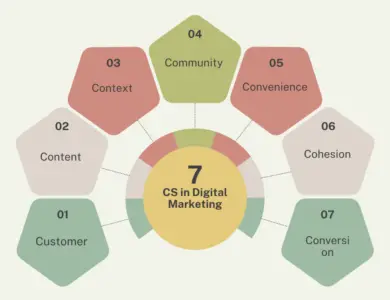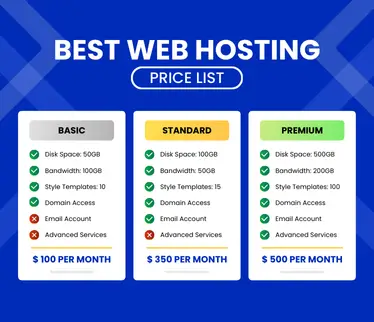
Table of Contents
Introduction
Choosing the right hosting for your website is a critical decision that can greatly influence your site’s performance, security, and success. With so many different options available—shared hosting, VPS hosting, cloud hosting, and WordPress hosting—finding the best one for your needs can be overwhelming. This guide will walk you through ten essential secrets to help you find the best hosting service for your website.
1. Understand Your Hosting Needs
The first and most important step in selecting the best hosting is understanding your own needs. Not all websites require the same features. A small personal blog won’t need the same resources as a large e-commerce store, just as a company website with thousands of daily visitors will require a more robust hosting solution.
- Personal Blogs: If you’re running a personal blog or a small website, shared hosting or WordPress hosting may be sufficient. These options are affordable and offer easy setup.
- Small Businesses: If your business is growing, a scalable option like VPS hosting or cloud hosting will provide the flexibility to expand your resources as your site grows.
- E-commerce Websites: If you’re running a complex e-commerce site, you’ll need website hosting that offers high reliability, security, and ample bandwidth to handle heavy traffic.
Understanding your site’s traffic, resource requirements, and long-term growth is key to choosing the right option.
2. Compare Different Types of Hosting
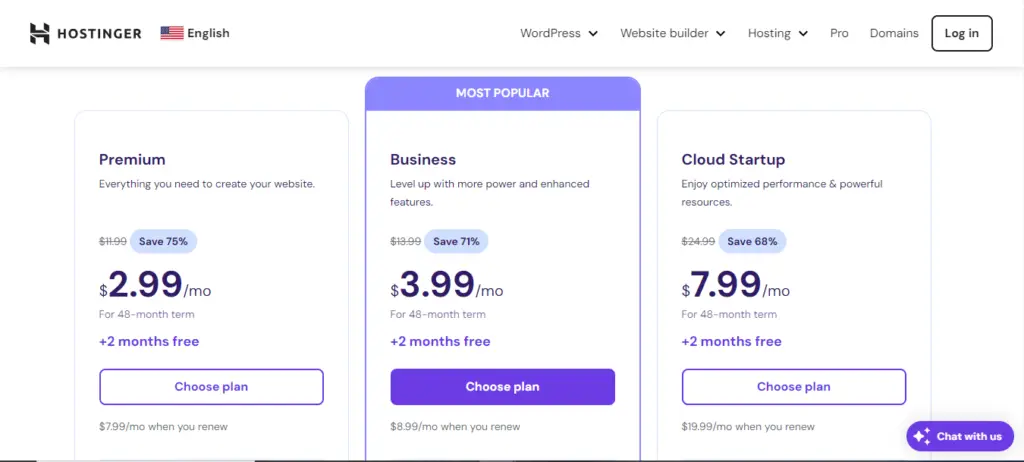
Once you know your specific requirements, it’s time to compare the different types of hosting available. There are four main types of web hosting to consider:
- Shared Hosting: This is the most basic and affordable option. It’s best suited for smaller sites with lower traffic levels. Your website shares server resources with other sites, which can lead to slower performance if one site uses excessive resources.
- VPS Hosting: In this, a physical server is divided into virtual sections, giving you more control and resources. It’s an ideal choice for businesses that need more power and customization without the cost of a dedicated server.
- Cloud Hosting: For sites that experience fluctuating traffic, cloud hosting is a great solution. It allows for scalability by distributing your site’s resources across multiple servers. This ensures higher uptime and faster load times even during traffic spikes.
- WordPress Hosting: Specifically optimized for WordPress sites, this type ensures fast speeds, easy installations, and specialized support for WordPress users.
By comparing these types, you can find the best balance of cost, performance, and scalability.
3. Prioritize Uptime and Reliability
One of the most critical factors to consider when choosing the best web hosting provider is reliability. Website downtime can lead to lost revenue, poor user experiences, and negative SEO rankings. Ideally, your hosting provider should offer a minimum of 99.9% uptime.
When evaluating uptime, look for hosting providers with strong reputations in uptime guarantees. For instance, Hostinger is known for its reliable uptime and stable services. Additionally, cloud hosting and VPS hosting typically offer more consistent uptime compared to shared hosting, due to better resource allocation and load management.
4. Look for Scalability Options
As your website grows, so will your hosting needs. This is why it’s crucial to choose a provider that offers scalable solutions. A small blog today might evolve into a high-traffic website tomorrow, and you don’t want to be stuck with a plan that can’t support your growth.
- Shared Hosting: This option has limited scalability. Once your traffic outgrows the shared resources, you’ll need to upgrade.
- VPS Hosting: More scalable than shared hosting, VPS hosting allows you to increase your resources (like RAM, CPU, and storage) as needed.
- Cloud Hosting: This is the most scalable option because it uses multiple servers to meet your resource demands. If your traffic spikes unexpectedly, cloud hosting will automatically allocate additional resources to keep your site running smoothly.
By choosing a scalable solution, you can ensure that your it will grow alongside your website without significant downtime or complications.
5. Investigate Customer Support Quality

No matter how well-optimized your web hosting provider is, issues can still arise. When they do, having access to quick, reliable customer support is essential. Look for providers that offer 24/7 customer service via multiple channels, including live chat, email, and phone.
- Hostinger: Known for its affordable plans, Hostinger also offers excellent customer support. Their support team is available 24/7 and has a solid reputation for solving issues promptly.
- Cloud Hosting Providers: Many cloud hosting services offer premium support options for businesses that require immediate assistance.
Make sure your provider offers prompt and knowledgeable support that can assist you in case of technical issues.
6. Analyze Security Features
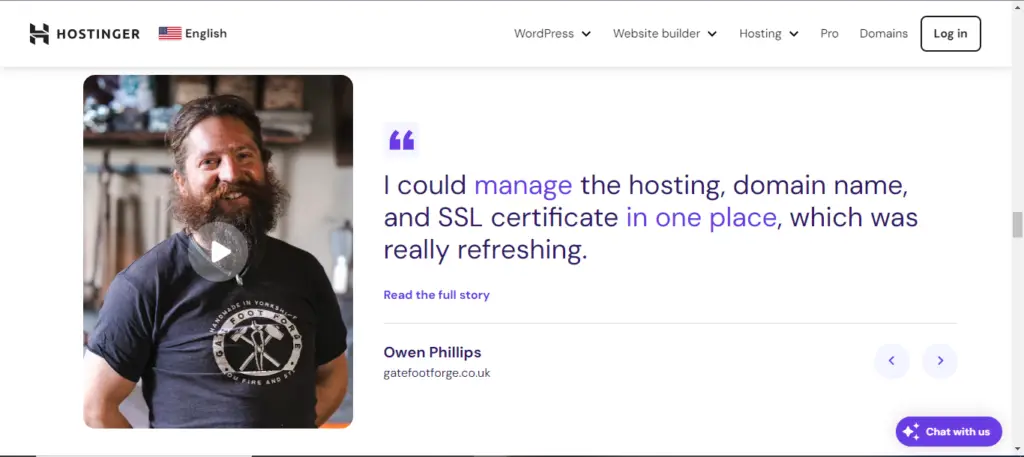
Security should be a top priority when selecting the best website hosting. A good provider should offer robust security features to protect your data and your visitors’ information. Important security features to look for include:
- SSL Certificates: An SSL certificate encrypts data between your site and your users, protecting sensitive information. Most hosting providers, including Hostinger, offer free SSL certificates.
- Firewalls and Malware Scanning: Regular malware scanning and firewalls are essential to keep your site safe from attacks.
- Automated Backups: providers should offer automatic backups so you can quickly restore your site in case of data loss.
Both VPS hosting and cloud hosting tend to offer enhanced security options, giving you more control over your site’s protection.
7. Consider Speed and Performance
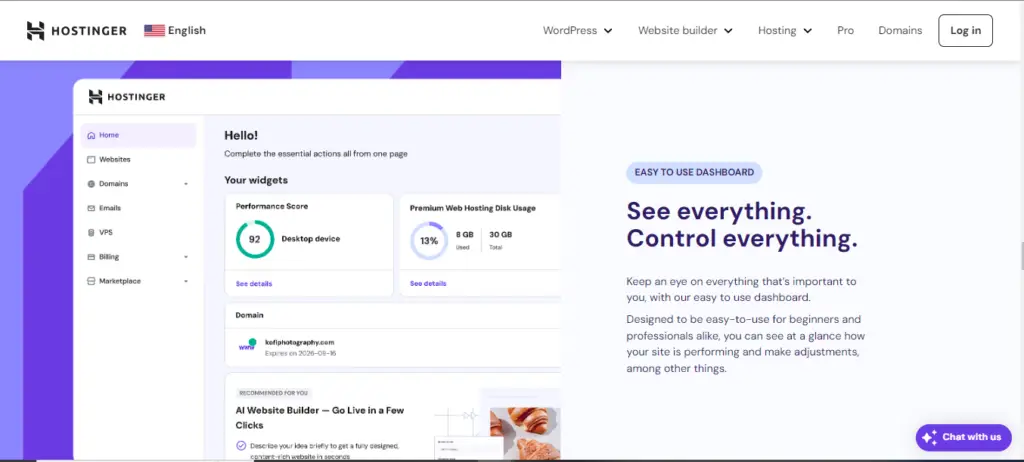
Your provider plays a major role in your website’s speed and performance. A slow-loading website can frustrate visitors, reduce conversions, and hurt your search engine rankings. When choosing a hosting service, consider the following:
- Server Location: The closer the server is to your target audience, the faster your website will load. Many hosting providers offer data centers in multiple locations.
- Resource Allocation: VPS hosting and cloud hosting generally provide better resource allocation compared to shared hosting, resulting in faster load times.
- Optimized Hosting: WordPress hosting is specifically optimized for WordPress websites, ensuring faster performance. Services like Hostinger offer optimized servers to enhance your site’s speed.
By prioritizing speed and performance, you’ll improve both your user experience and your site’s SEO.
8. Factor in Pricing and Value for Money
When selecting a provider, it’s essential to balance cost with the features and services that you need. While shared hosting is the cheapest option, it may not always offer the best value in terms of long-term performance and reliability.
- Shared Hosting: Best for beginners or small sites, but it can lead to performance bottlenecks as your traffic grows.
- VPS Hosting: Mid-tier in pricing, VPS hosting offers more resources and better performance, making it a good value for medium-sized businesses.
- Cloud Hosting: Generally more expensive than shared and VPS hosting, but it’s worth the investment for businesses that need high scalability and performance.
Remember to factor in renewal rates, as many providers offer introductory discounts that increase significantly upon renewal. Providers like Hostinger are known for affordable plans without compromising on essential features.
9. Check for WordPress-Specific Features
If you’re running a WordPress site, selecting a service that caters specifically to WordPress can significantly simplify your setup and maintenance. WordPress hosting often includes features like:
- One-Click Installations: Allows you to set up WordPress quickly and easily.
- Pre-Configured Security: Optimized for WordPress security, with additional protections like brute force detection.
- Automatic Updates: Ensures your WordPress installation and plugins are always up to date.
Hostinger and other WordPress hosting providers offer these features to enhance performance and ease of use for WordPress site owners.
10. Read Reviews and Testimonials
One of the best ways to gauge the quality of a web hosting provider is to read reviews and testimonials from current or past users. This can give you insight into factors like customer support, uptime, and performance that might not be evident from the provider’s website.
Look for reviews from people who have websites similar to yours, and pay attention to any common complaints or issues. Popular providers like Hostinger, VPS hosting companies, and cloud hosting services often have detailed reviews available on forums, blogs, and comparison websites.
Conclusion
Finding the best hosting for your website doesn’t have to be a daunting task. By understanding your needs, comparing the various types, and carefully evaluating factors like scalability, security, and customer support, you can make an informed decision that ensures your website’s success. Whether you’re looking for WordPress hosting, VPS hosting, or cloud hosting, taking the time to assess your options will pay off in the long run.
When in doubt, trusted providers like Hostinger offer a range of hosting solutions tailored to different needs, ensuring that you’ll find the perfect fit for your website.

Aitizaz Rahim is a dynamic Digital Marketing and SEO expert, empowering businesses worldwide with proven strategies. As the founder of Masterblogerz, he shares actionable insights to help others master the digital marketing world.


